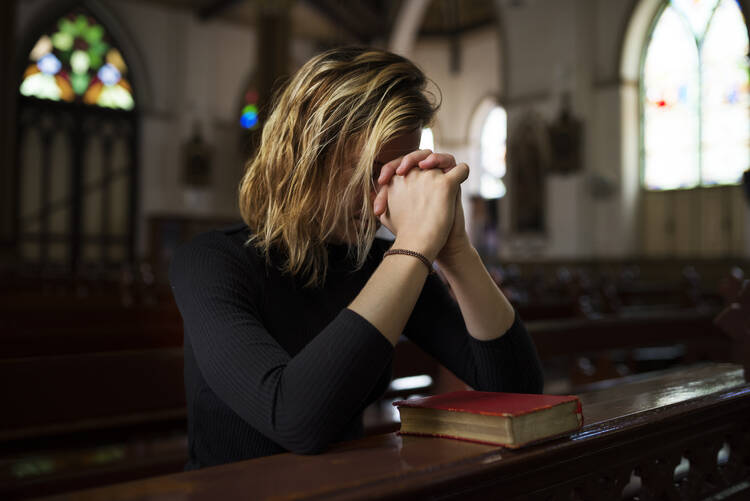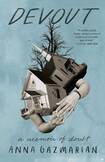Review: The intersection of faith and mental illness
During her freshman year of college, Anna Gazmarian was diagnosed with bipolar disorder. Her constant oscillating between mania and deep depression finally had a name. But, as she explains in Devout: A Memoir of Doubt, Gazmarian does not remember reading about bipolar disorder in the Bible. Instead, she recalls biblical scenes of demonic possession, of Jesus casting out evil spirits and setting the souls of the afflicted freed.
In the evangelical Christian community in which she grew up, depression was blamed on demonic activity or a lack of “spiritual fitness.” Her church community repeatedly affirmed that her spiritual “ineptitude” led to her mental and emotional failings, and that her biological inability to “be positive” was actually just her refusal, as one pastor put it, to “look on the bright side of things like Christians do.”
In the early chapters of the memoir, we meet Gazmarian at the intersection of faith and mental health. She recalls growing up in a faith-based community in Winston-Salem, N.C., and as a young evangelical, she played by the rules: no reading Harry Potter, and no interpreting tarot cards for fear that they could summon evil spirits. She wore a purity ring, listened to Christian pop music and tried to find a “bright spot” whenever she shared stories of her mental anguish. She often shared these stories with her mother, who, as an evangelical, managed to dismiss Gazmarian’s early signs of bipolar disorder as simply her inability to find hope and happiness in the “good news” (the word evangelical is, in fact, derived from “good news” in Greek).
She tried to make sense of her own torment, including suicidal ideations that begin in high school, all while being told she was beloved by God. But these questions of theodicy consumed Gazmarian’s overwrought mind. “If only I said the right words, or read the right things, or through the right thoughts, then maybe God would help me,” she writes.
Faith could not free her from her anguish, and she failed to see any practical reality in the messages of Jesus’ healing that pastors, Bible study groups and spiritual directors quoted to her, like: “Daughter, your faith has healed you. Go in peace and be freed from your suffering” (Mk 5:34). Faith did not heal Gazmarian; instead, an affliction of doubt haunted her.
Devout is a critique of how people of faith often respond to believers who are struggling with their mental health—and how faith answers to mental health crises while also preaching that each individual is made in the imago Dei. Gazmarian is told by church leaders that all the torment and mania she experiences is “the fault of [her] decisions alone” rather than a clinical disease or a biological predisposition. How could a loving God create her this way?
Gazmarian is (as am I) of Armenian descent, and she has written in the past about the horrors of the Turkish genocide against Armenians in 1915-16. Her struggles with God in Devout are reminiscent of Jewish writers like Primo Levi and Elie Wiesel, who both tried to reconcile a belief in God with a straightforward recognition of the evils present in the world, particularly with regard to the Holocaust.
Left without adequate support from her community, Gazmarian finds herself in the hands of mental health professionals who try to stabilize her internal turbulence. But over the course of young adult and adult life, doctors send her through rounds of misdiagnoses and multiple drug treatments, and they dismiss her questions and symptoms, both of her disease and the prescription cocktails, with the refrain “I’ll see you again in two weeks.”
The elements of her narrative that deal with the science of her disease are grounded in facts. When she learns that an attention deficit hyperactivity disorder (A.D.H.D.) diagnosis from her childhood can overlap with symptoms of her bipolar diagnosis, she interweaves citations of medical studies into the text, almost as if she is fact-checking her doctors. The certainty with which she recounts her misdiagnosis is juxtaposed against the swirling chaos of doubt in her faith life.
There is a sense of sterility and clarity in these moments, as she sits in waiting rooms completing intake forms or in cold leather chairs across from a new doctor. But it is easy to get lost in her timelines. While most of the memoir operates distinctively in the past or present, sometimes flashes between her present reflections as the author and her past self-introspection can be muddled. Names of drugs and their side effects start to merge, both within the body of Gazmarian and in the body of the text.
Gazmarian went through several stages of trial and error until a doctor suggested that she try ketamine to alleviate the symptoms of her bipolar disorder. If you are attuned to the world of psychiatry, names like Cymbalta, Lamictal, doxepin and Trileptal may be familiar, as they are prescribed in rapid succession, in no less than five pages.
In trying to understand who she is, in the context of both her shifting spiritual understanding and in a relentless faith community that weaponized her faith against her, Gazmarian writes in the preface: “I’ve been breaking down and rebuilding my concept of faith, searching for a faith that can exist alongside doubt, a faith that is built on trust rather than fear.”
Yet the author never tells the reader why she has remained with her evangelical community. Though stories about the balance between treating her diagnosis and maintaining the rest of her life—focusing especially on her education as a writer and poet and on her relationship with her husband, David—abound in the memoir, Gazmarian does little to explain why she remains connected to her faith.
“I needed someone to tell me that despair was also a function of faith, that even Jesus wept,” she writes of her spiritual director, Whitney, but he is one of the only salvific, “religious” figures in the memoir.
Her poems, described by Gazmarian though not included in the memoir, do not focus on spirituality but rather the milieu of the everyday. She details the relationship formed with a professor—someone who, seemingly the first to do so, sees past her mental illness and perceived brokenness and teaches her to use them as her strength.
She cites biblical stories and their examples of suffering but never seems to identify what “good news” she draws from them now, only explaining what solace (or lack thereof) they provided for her past self. This is not to say the text does not answer questions that believers often ask. For those of us raised in a particular religious tradition, Gazmarian asks, “Can any of us be truly free from the ideas that shape us?” Through stories of encounters with believers and nonbelievers throughout her life, she answers with a resounding no.
This is seen most clearly in the portrait of her marriage to David, where Gazmarian spends their first years as a couple convinced that because of her illness, she is unequipped to be a loving wife to David and, later, as mother to their child, Ezra. At their wedding reception, a scene she likens to the story of the wedding at Cana, she reflects that “if this isn’t a miracle, I don't know what is.” She sees God’s sacrificing grace peering through these human moments, and her honesty in these reflections makes the memoir’s dedication “to David and Ezra” all the more meaningful.
“God will never put you through something you can’t handle” is a mantra in her Christian community—and words often echoed by her mother. Devout shows how Gazmarian has “handled” and continues to handle what she has been put through, but it does not shy away from the depths of despair and doubt that are seemingly imbued within God’s providence for her. There is no tell-all scandal about her evangelical community. There is no great uncovering of medical malpractice. Instead, Devout is an emotional, vulnerable portrait of a woman who was failed by two institutions, both science and religion, that she rightfully believed would help her.
Editor's note: A previous version of this review incorrectly identified Devout as a novel. It is a memoir.
This article also appeared in print, under the headline “When Faith Fails Us,” in the November 2024, issue.











